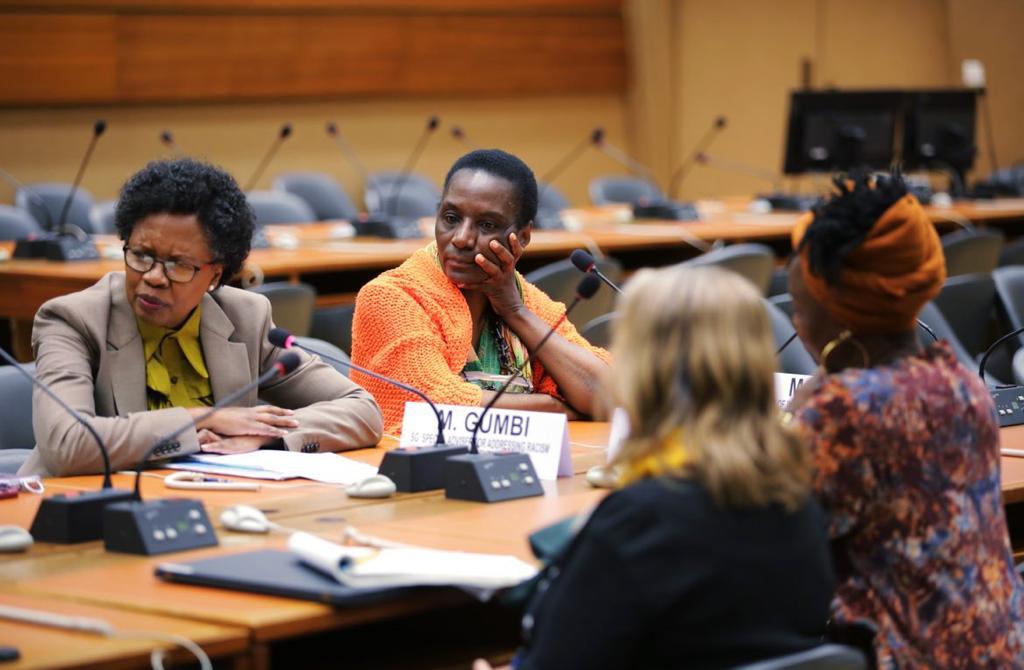With an ongoing campaign to ‘Lead on Anti-Racism at UNOG’ that has just earned her the Secretary-General Award for Workforce Diversity, we spoke to Marie Diur, Chief, Interpretation Service at the United Nations Office in Geneva. Elated and more motivated than ever by her recent accolade, UNOG’s Anti-Racism advocate, Marie sees her work as only having just begun: here she shares the latest plans to help remove race inequalities at the UN and gives her thoughts on how we can achieve this.
UNOG Director General has recently endorsed a set of recommendations to fight racism and racial discrimination at the workplace. What are the main areas covered by the recommendations?
These recommendations target eight main areas where fundamental change can really make a difference to the way we understand and tackle racial inequality: recruitment and selection, movement of staff, performance management, the informal and formal justice systems, accountability, training and capacity building, awareness raising through internal communication, inter-agency collaboration and knowledge-sharing.
Who will be responsible for implementing the recommendations?
We are all responsible for implementing the recommendations. Of course, there are some entities and services that will play a more key role than others, but we are all ultimately responsible to act on the recommendations, as they stem directly from the UN Secretary-General’s Strategic Action Plan that as UN staff, we have a responsibility to see through. We therefore all definitely have a role to play in this fight. We are all in this together. Implementing these recommendations is really going to be a global group effort, supported by all entities, and key players at those entities, such as HR – when you look at it on this scale, I am confident we can all achieve these goals, together.
A one-year roadmap has been adopted to implement those recommendations. Is one year enough to implant such an ambitious roadmap?
Building an organization free of racism is a long journey. One year is not enough to achieve everything, but it is enough to get started. Some recommendations are easier to implement than others. There are short, medium, and long-term recommendations, and we need to go through all the steps – this will take time, but it will be worth the effort.
The call to be better, to do better, has to be constant. We will need time to collect statistics and data, to come up with evidence-based results and conclusions. Take the example of the UN’s Gender strategy, at the beginning, no one was talking about it, and nothing changed for a while. But day by day, people’s mindsets started changing, because the information was there, everybody was waiting for a change to happen, hiring managers were given very clear instructions and here we are today. The important thing is to start, because if you never start then you never get to where you want to be.
What have been to date your main achievements as a UNOG anti-racism advocate?
I’m most proud of having raised awareness about racism at UNOG. People can no longer say they did not know that there was racism at the UN and that some services lack diversity. They can no longer turn a blind eye because we have been vocal about this issue, through activities on many levels. The SG has already acknowledged that racism does exist within the UN so we do not need to ask ourselves the question. The acknowledgement is there. Now we need solutions.
We are just at the beginning of the journey, and even if people are under the impression that nothing is happening, believe me, something is happening. People cannot help but be aware of the situation, even if they still don’t want to see it. All eyes are on areas where change can happen – e.g., we are looking at what hiring managers are going to do – we are all expecting changes. Hiring to increase diversity is not only recognising that there is a lack of diversity but is an opportunity to ensure that diversity becomes a reality.
Do you think people are changing mindsets because they know people are watching?
People are changing mindsets because they know there is no going back. The same happened when the Gender strategy was adopted. You can no longer find an all-male section at the UN, which was the case decades ago. The Strategic Action Plan on Anti-Racism will need to extend to all CEB agencies, just as the System-wide Strategy on Gender Parity does. This across-the-board approach is important if we really want something to change.
One of my goals for 2023 – 2024 is to create an Alliance of all Geneva-based agencies through the appointment of Anti-Racism Champions, just as we did with Gender Champions. We also have plenty of activities planned for this year to raise awareness, to follow on from the recommendations. I think it is a huge undertaking and follow-up will be key. If there are obstacles, we need to analyze the situation further, adjust and keep moving.
There is an impression that the issue of racism and racial discrimination is not attracting the same attention as it might have done two years ago. What are your views on this?
I think it is normal. For all issues, there is hype that can arise from different issues and events, with lots of attention from traditional and social media, and from people in general. Then, a little later, it might feel like the issue has faded from view. I am not worried about this though: even if it feels like nobody is paying attention, the issue is still very much alive, the fight is definitely still continuing. There are a lot of us working hard behind the scenes to make sure the right things will and do happen. We are here and we are here to stay.



